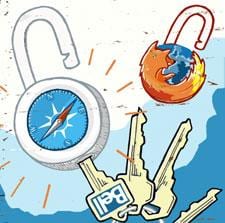The technology that allows corporations like Bell Canada to manage internet traffic also allows them to know and control every single move an internet user makes.
Bell has been in the news lately because of its so-called “traffic shaping” protocols which allow the company to impose limited access at certain times of the day on those using peer-to-peer (P2P) technology to download large files. The result is that downloading those files — which can include movies, music or software updates — can take much longer in the afternoon and night than in the morning.
Bell claims that such controls are necessary to allow equal web access to everybody.
What has been less well covered is that the technology that allows Bell to manage traffic flow is controversial software called Deep Packet Inspection (DPI). The software gives Bell the power to monitor absolutely everything that any web surfer using Bell phone lines — virtually everybody in Ontario and Quebec — is doing.
“There’s almost no limit to what they can do,” says Philippa Lawson, the director of the Canadian Internet Policy and Public Interest Clinic (CIPPIC) at the University of Ottawa. “They could be going through web traffic, emails, collecting that data and building up a profile.”
Tom Copeland, the chair of the Canadian Association of Internet Providers (CAIP), says DPI could give corporations unlimited power. CAIP filed a complaint against Bell with the Canadian Radio-television and Telecommunications Commission which was dismissed in November.
Copeland says DPI gives Bell — and potentially law enforcement or government — the ability to monitor anyone’s private web activities, which could include porn or conversations about sexuality.
“When we see how the internet is being used in other countries — China comes to mind — we have the potential for carriers to be doing what governments are doing,” Copeland says. “They could be censoring content or allowing access only to certain content.
“The online community doesn’t fully appreciate the danger potential.”
Copeland says the more immediate possibility is that Bell and other carriers could use DPI to target advertising or to favour their own online businesses.
“That’s when we start getting into the whole net neutrality argument,” says Copeland. “Most of the carriers in Canada also have some sort of control over the media — Bell with CTV and the Globe and Mail. They all have some interest in promoting their own content over their competitors’ content.”
Copeland and Lawson both say Bell and other companies deny using DPI to build up consumer profiles or to direct surfers to certain businesses.
“They know they’re not allowed to do that, it’s illegal,” says Lawson. “So they say they’re not and they’re probably not.”
Nonetheless CIPPIC has filed complaints this year with the federal office of the Privacy Commissioner against Bell and other ISPs like Rogers and Shaw.
“This is a complaint… regarding the unnecessary and non-consensual collection and use of personal information by Rogers Communications Inc through the use of Deep Packet Inspection technology,” reads one such complaint. “In brief we understand that Rogers is engaging in internet traffic management practices that involve the inspection of internet traffic headers and content, both of which contain information that can be linked to internet subscribers…. Based on our research we also suspect that Rogers may be engaging or preparing to engage in the collection of subscriber data via DPI in order to target advertising at individual users.”
Copeland says that even if “traffic shaping” is the only reason for such activity, it’s a false rationale. He says he doesn’t believe the system can’t handle the traffic and that, even if control is necessary, it’s only a handful of surfers downloading huge amounts of data regularly.
“It’s very difficult to believe they have this problem across the whole network,” says Copeland. “Maybe in parts where they haven’t been able to upgrade the system. They’re just throwing a wet blanket over the whole user base. There may be a problem with P2P but that’s going to be one or two individuals, not tens of thousands like me who use it for occasional downloads.”
Copeland says Canadian politicians have paid very little attention to the issue so far.
“We don’t have a single MP, except for Charlie Angus of the NDP, who’s even taking an interest,” he says.
Lawson says the US is far ahead of Canada in responding to the issue.
“We in Canada have stronger privacy laws,” she says. “In the US they don’t have the laws but the regulator, the Federal Communications Commission, has guidelines after there was a complaint against Comcast for throttling internet traffic.”
Bell Canada did not respond to Xtra’s requests for an interview.


 Why you can trust Xtra
Why you can trust Xtra


